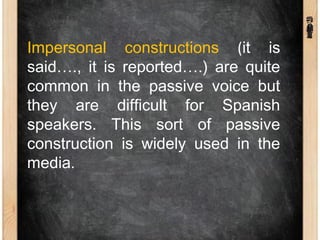
Impersonal constructions (it_is_said
- 1. Impersonal constructions (it is said…., it is reported….) are quite common in the passive voice but they are difficult for Spanish speakers. This sort of passive construction is widely used in the media.
- 2. Verbs that refer to saying or thinking….. believed “se cree” reported “se informa” said “se dice” thought “se piensa” It is known “se sabe” supposed “se supone” considered “se considera” expected “se espera” …are often followed by a to-infinitive form in the passive. Impersonal passive is formed following the structure: to be + past participle + subject + To-infinitive form
- 3. Here are some examples: ACTIVE: Everybody thinks Cathy works very hard. PASSIVE 1: Cathy is thought to work very hard.(Se piensa que Cathy trabaja mucho) PASSIVE 2: It is thought that Cathy works very hard.(Se piensa que Cathy trabaja mucho) ACTIVE: They believe Tom is wearing a white pullover. PASSIVE 1: Tom is believed to be wearing a white pullover.(Se cree que Tom lleva un jersey blanco) PASSIVE 2: It is believed that Tom is wearing a white pullover.(Se cree que Tom lleva un jersey blanco)
- 4. There are FOUR INFINITIVE FORMS , which we will use depending on the tense we have in the active sentence: Simple: to write Continuous: to be writing Perfect: to have written Perf.see this example: have beenthink their best customers Let’s Continuous: to Retailers writing are aged between 25 and 40 IN ORDER TO MAKE THIS TYPE OF PASSIVE SENTENCE… First, we Take the subject of the second sentence: their best customers Second, we put passive verb of the Reporting verb in the same tense as in the active: are thought Third, we put the verb of the second sentence in the Infinitive form: to be Their best customers are thought to be aged between 25 and 40
- 5. WHICH FORM OF THE INFINITIVE DO WE USE? •If it carries an idea of present or future Simple: to write • If it carries an idea of past, whatever the tense (Past Simple, Past Perfect, Present Perfect) Perfect: to have written • If either of them are in a continuous form, you use the adequate Infinitive continuous form: to be writing or to have been writing MORE EXAMPLES: SOME ACTIVE PASSIVE They say she works hard. She is said to work hard. They say she played well. She is said to have played well. They said she has done well. She was said to have done well. They believe he is having an affair. He is believed to be having an affair. He is believed to have been having They believe he has been having an an affair. affair. The repairs are believed to have been She believes the repairs have been
- 6. WHICH FORM OF THE INFINITIVE DO WE USE? •If it carries an idea of present or future Simple: to write • If it carries an idea of past, whatever the tense (Past Simple, Past Perfect, Present Perfect) Perfect: to have written • If either of them are in a continuous form, you use the adequate Infinitive continuous form: to be writing or to have been writing MORE EXAMPLES: SOME ACTIVE PASSIVE They say she works hard. She is said to work hard. They say she played well. She is said to have played well. They said she has done well. She was said to have done well. They believe he is having an affair. He is believed to be having an affair. He is believed to have been having They believe he has been having an an affair. affair. The repairs are believed to have been She believes the repairs have been